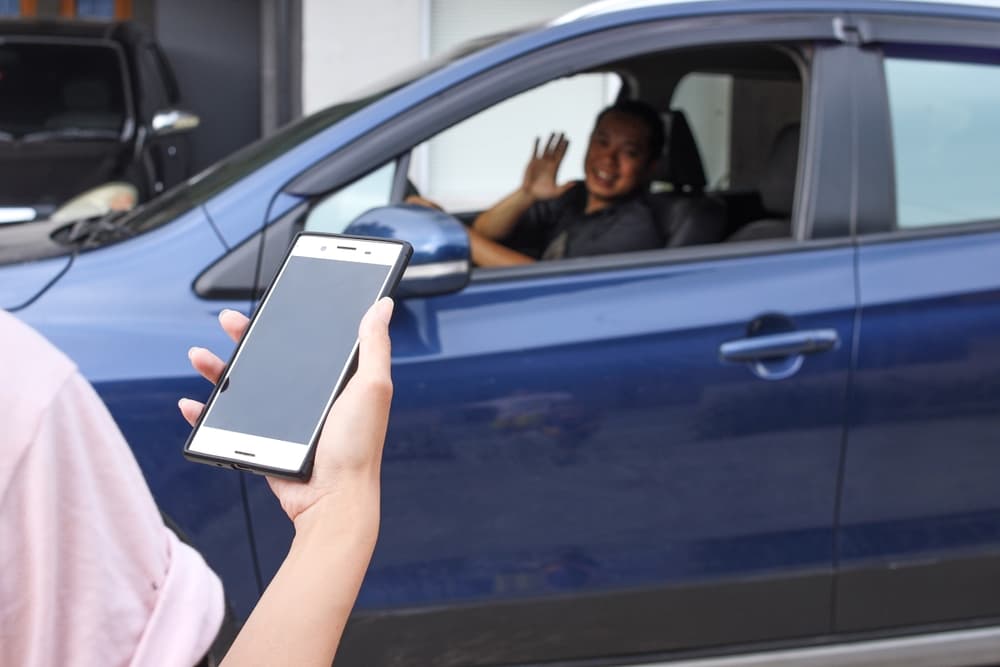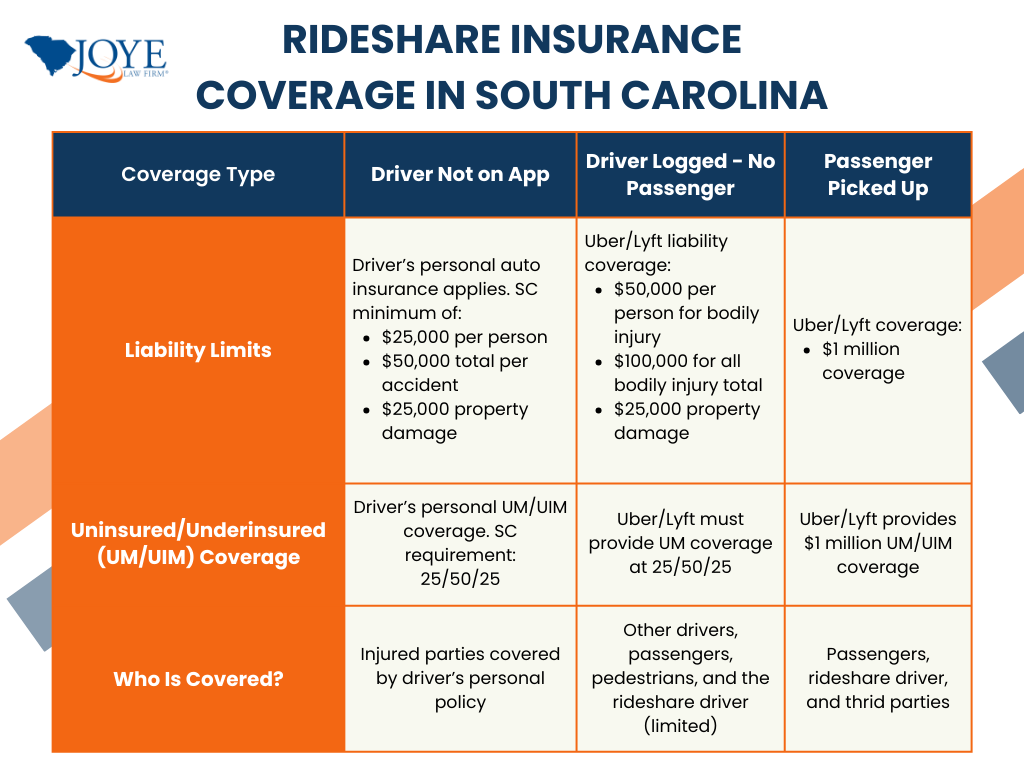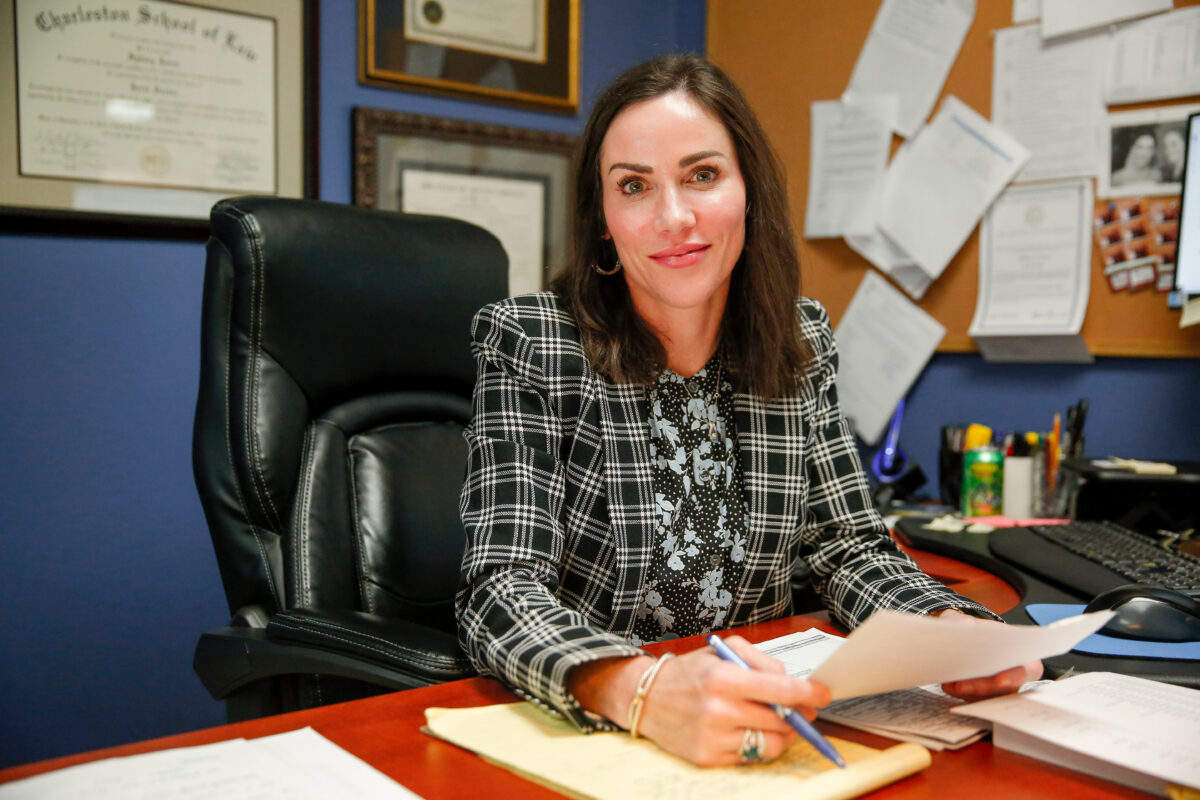
A rideshare accident can change your life in seconds. After a crash involving an Uber or Lyft vehicle, you may be dealing with rising medical bills, time away from work, and questions about who should pay for your losses. At Joye Law Firm Injury Lawyers, we understand what you are going through. Since 1968, our Columbia accident lawyers have helped thousands of injured individuals throughout Midlands, including Richland, Lexington, Fairfield, Kershaw, Calhoun, Newberry, Saluda, and Sumter counties.
Accidents involving a rideshare driver, a rideshare company, and other vehicles are more complex than a typical car accident. Insurance companies may try to settle your claim for less than you deserve by disputing the driver’s ride status at the time of the crash. Or, they may push back on which insurance policy should apply. Don’t let them get away with it.
Our Uber or Lyft accident attorneys help you understand your legal rights and protect your claim. We work to hold the Lyft or Uber driver or the rideshare company responsible. You need answers after your accident. We offer a free consultation and a No Fee Guarantee, so there’s nothing to lose. Call us day or night at (888) 324-3100 to speak directly with a member of our legal team.
Why Choose Joye Law Firm for Your Columbia Rideshare Accident Case?
Understanding who pays after a rideshare accident is not simple. Insurance coverage depends on what the rideshare driver was doing when the accident occurred. If the driver was waiting for a ride request, Uber or Lyft may provide limited coverage. If the driver was carrying a passenger or was on the way to pick one up, the rideshare company’s full insurance policy applies.
These changing insurance rules make it harder for injured victims to know where to turn. Insurance companies often deny or delay claims by arguing that another driver or rideshare company should pay. Without help from a local Columbia rideshare accident lawyer, you may not know how to respond.
At Joye Law Firm, we stay up-to-date on the latest developments in rideshare law and have the resources to thoroughly investigate your case. We have a track record of successfully resolving a range of car accident cases. While past results do not guarantee future outcomes, each case highlights our dedication to fighting for fair compensation and supporting our clients through their recovery.
- $600,000 settlement for a client of Attorney Milt Stratos who was severely injured when their rideshare driver drove through a four-way stop without yielding and slammed into a passing vehicle.
- $535,000 settlement for a Lexington man who sustained multiple injuries as the result of a head-on car collision.
- $500,000 jury verdict in York County for a woman injured after being t-boned by a tractor-trailer
We help clients fight denied claims, file their paperwork correctly, and demand fair payment for medical bills, lost wages, and an estimate of all future expenses that can arise long after a case is resolved. Our team’s experience handling rideshare cases makes a real difference in our clients’ results.
We focus on what matters: making sure you receive clear answers and real help. That’s why so many rideshare accident victims in Columbia choose Joye Law Firm.
Understanding Rideshare Accidents in Columbia, SC
Services like Uber and Lyft have become a staple for daily travel for people throughout the Midlands. They provide a convenient way to get around, whether it’s for daily transportation or as an option for going out without worrying about drinking or driving late at night.
All you want is to get to your destination safely. You open the app and request a ride. Within minutes, you’re in the back seat of a car and on your way. But everything can change suddenly if you are involved in a car accident. In an instant, your routine ride can become a nightmare of pain, confusion, and worry. With the increase in rideshare usage comes an increase in rideshare-related accidents.
According to the Columbia Police Department’s most recent Annual Report, the Traffic Safety Unit investigated 633 traffic collisions, including 16 fatal collisions. While this data isn’t specific to rideshare accidents, it highlights the overall risk on our roads.
These statistics underscore the importance of safe driving practices and the need for experienced legal representation if you’re involved in an accident.
The Impact of Rideshare Services on Traffic Safety
A study published by the U.S. Department of Health and Human Services noted that ridesharing companies have facilitated more than 11 billion trips worldwide since operations began in 2010. While these services have been associated with some positive trends in traffic safety, this massive scale of operation inevitably leads to some accidents.
The Cato Institute released a report examining how the availability of rideshare services nationwide has affected traffic crashes and crime. The study analyzed data from the National Highway Traffic Safety Administration and the FBI’s Uniform Crime Reporting program.
The study found:
- A general decline in fatal accident rates after Uber’s introduction, with an estimated 1.6% decrease for each quarter Uber was available in an area.
- Potential reductions in alcohol-related fatal crashes, nighttime fatal crashes, and overall vehicular fatalities.
- A decline in arrest rates for driving under the influence (DUI) was observed, with an estimated 0.8% decrease for each month ridesharing was available.
Some of these trends are encouraging, but collisions do have devastating consequences for those involved. Rideshares also pose unique risks, beyond collisions, particularly in situations where people may be vulnerable or caught off guard, such as late-night travel, unfamiliar locations, or relying on ridesharing services where trust in the driver is essential.
In 2021, the Samantha L. Josephson Ridesharing Safety Act was signed into law by SC legislators after the horrific killing of a University of South Carolina student who mistakenly entered a vehicle posing as a rideshare operator. The law implemented several changes aimed at reducing the risks of using rideshare services.




